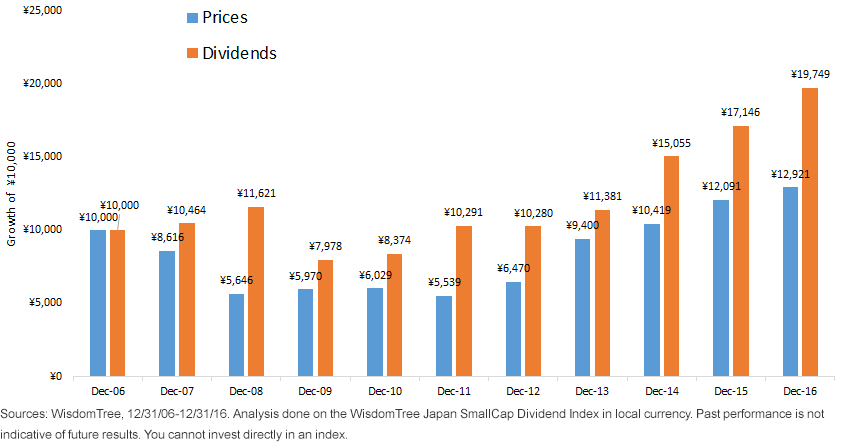Why We Like Japanese Small Caps Now




The last decade has not been a great time to be an investor in international stocks, but small-cap stocks internationally outperformed large-cap stocks, and Japanese small-cap stocks (WisdomTree Japan SmallCap Dividend Index) on a dividend-weighted basis actually outperformed the large-cap, market capitalization-weighted index (MSCI Japan Index)” by over 400 basis points (bps) per year over the last decade.

As value-oriented investors, we often believe in the theory of mean reversion, or the tendency for markets to move in cycles but revert to average returns over time. One might think now is the time for Japanese large caps over small caps—given they performed so badly over last decade.
While we believe there absolutely is a case for Japanese large caps—and that ties to the yen and growth in the global economy—below we outline some of the arguments for why Japan is still attractive today, particularly its small caps.
Fundamentals: Market Became Cheaper over Last Decade
Looking at just dividends and prices, one could argue the market actually got less expensive on a price-to-dividend basis over the last decade, as dividends grew faster than prices. Over the last 10 years, dividends grew 97.5%, or 7.04% per year, which is higher than the aggregate price growth of just 29.2%, or 2.60% per year.
WisdomTree Japan SmallCap Dividend Index: Price Growth vs. Dividend Growth

We expect that, with ample cash on their balance sheets and a focus on investor stewardship reforms, Japanese companies will continue to increase both dividends and buybacks over the next few years—a trend very supportive for the markets.
Sources of Future Cash Distributions
There has been a lot of talk about all the cash on U.S. companies’ balance sheets that will be paid as dividends and buybacks with different repatriation policies. Here’s what is interesting in terms of how these cash levels can impact valuations and also the potential for distribution growth: Japanese large-cap companies have three times the relative cash compared to market cap than U.S. large-cap companies (15% cash to market cap versus 5%).
Japanese small-cap companies have even more cash than large caps—at 21% cash to market cap. These are the highest levels compared to all other regions. This also means that when we look at valuation levels that compare, say, total market cap to total earnings, Japanese companies have an even greater discount because they have cash levels that make them 15% to 20% cheaper than their absolute levels.
Cash as a Percentage of Market Cap (ex-Financials)
.gif)
Finally, the investment case for Japanese small caps is based on our bullish view on the Japanese domestic economy: After decades of deflation, deleveraging and demand contraction, Japan’s domestic demand has entered a structural up-cycle driven by two fundamental forces:
- Demographic sweet spot: a structural shortage of labor is forcing improvements in both the quality of employment and the incomes earned from employment.
- Policy switch to fiscal dominance: Instead of relying on monetary policy to support the economy, in August 2016, the Japanese cabinet approved a multiyear supplementary spending program of ¥28 trillion, approximately 5.5% of GDP.1 This should support growth in Japan over the coming years.
The primary question an investor might have about implementing Japanese small caps is whether to hedge currency exposure or not. In this market insight, we discussed the negative correlations between the yen and equity markets suggest that a weak yen is still an important consideration and could be a further motivation for investing in Japan—if an investor thought the yen was going to weaken.
We would suggest a minimum of a 50% yen-hedged approach, with an argument that a full hedge would help mitigate the risk of the yen being a structurally weak currency over time.
1Source: Abe administration press release announcing program 8/1/16.
Important Risks Related to this Article
Investments focused in Japan increase the impact of events and developments associated with the region, which can adversely affect performance.Investments focusing on certain sectors and/or smaller companies increase their vulnerability to any single economic or regulatory development.
The MSCI information may only be used for your internal use, may not be reproduced or redisseminated in any form and may not be used as a basis for or component of any financial instruments or products or indexes. None of the MSCI information is intended to constitute investment advice or a recommendation to make (or refrain from making) any kind of investment decision and may not be relied on as such. Historical data and analysis should not be taken as an indication or guarantee of any future performance analysis, forecast or prediction. The MSCI information is provided on an “as is” basis and the user of this information assumes the entire risk of any use made of this information. MSCI, each of its affiliates and each entity involved in compiling, computing or creating any MSCI information (collectively, the “MSCI Parties”) expressly disclaims all warranties. With respect to this information, in no event shall any MSCI Party have any liability for any direct, indirect, special, incidental, punitive, consequential (including loss profits) or any other damages. (www.msci.com)

Jeremy Schwartz has served as our Global Chief Investment Officer since November 2021 and leads WisdomTree’s investment strategy team in the construction of WisdomTree’s equity Indexes, quantitative active strategies and multi-asset Model Portfolios. Jeremy joined WisdomTree in May 2005 as a Senior Analyst, adding Deputy Director of Research to his responsibilities in February 2007. He served as Director of Research from October 2008 to October 2018 and as Global Head of Research from November 2018 to November 2021. Before joining WisdomTree, he was a head research assistant for Professor Jeremy Siegel and, in 2022, became his co-author on the sixth edition of the book Stocks for the Long Run. Jeremy is also co-author of the Financial Analysts Journal paper “What Happened to the Original Stocks in the S&P 500?” He received his B.S. in economics from The Wharton School of the University of Pennsylvania and hosts the Wharton Business Radio program Behind the Markets on SiriusXM 132. Jeremy is a member of the CFA Society of Philadelphia.



